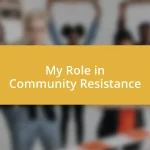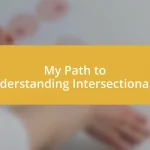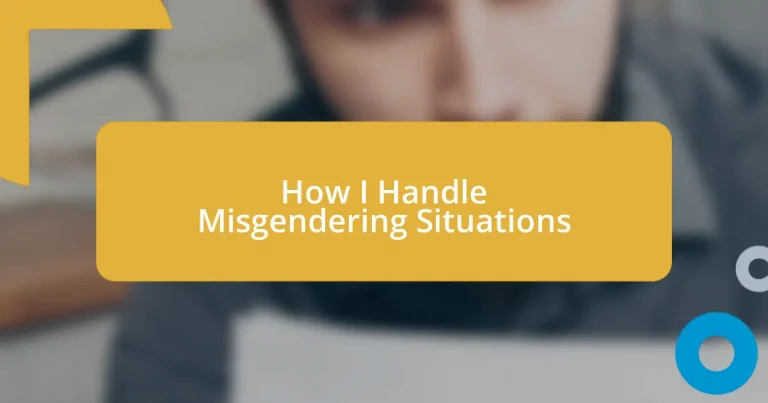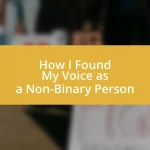Key takeaways:
- Misgendering often results from a lack of understanding and can be mitigated through patience and education.
- Acknowledging pronouns is essential for validating identities, fostering respect, and creating safe environments.
- Responding calmly to misgendering can lead to constructive conversations and deeper understanding.
- Building supportive networks and educating others can amplify voices and create positive change in attitudes toward gender identity.
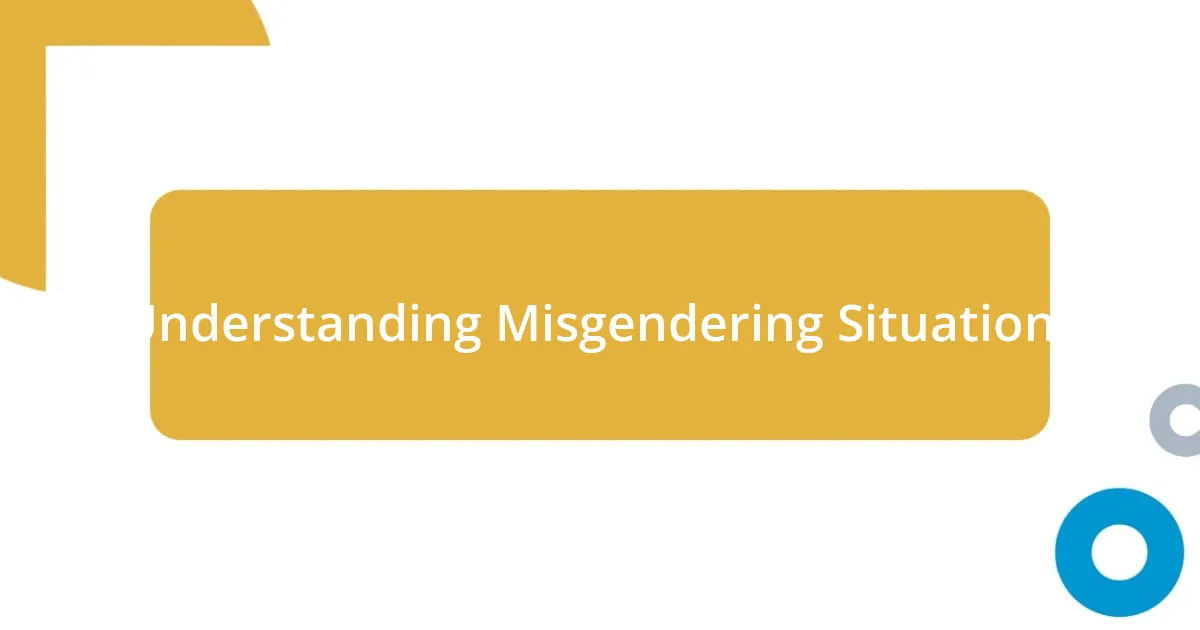
Understanding Misgendering Situations
Misgendering situations can be incredibly disheartening, especially when they occur in spaces where acceptance should thrive. I remember a time when I was at a family gathering, and my relative casually used the wrong pronouns in front of everyone. It stung, not just because it felt invalidating, but because it brought up the question: Why is it so difficult for some to see beyond the surface?
As I reflect on these experiences, I realize that misgendering often stems from a lack of understanding or familiarity. It’s easy for people to fall back on societal norms or past experiences, rather than actively engage with someone’s identity. I once had a friend who, despite their good intentions, consistently misgendered me. It took several conversations for them to grasp the impact of their words, highlighting how crucial patience and education are in these situations.
Listening to others’ accounts of misgendering can be an eye-opener. It reinforces the idea that we all have a role to play in fostering inclusivity. What struck me was a moment when a colleague stepped up to correct another person on my behalf. It made me think: How much more could we achieve if we all advocated for one another when it comes to respecting identities?
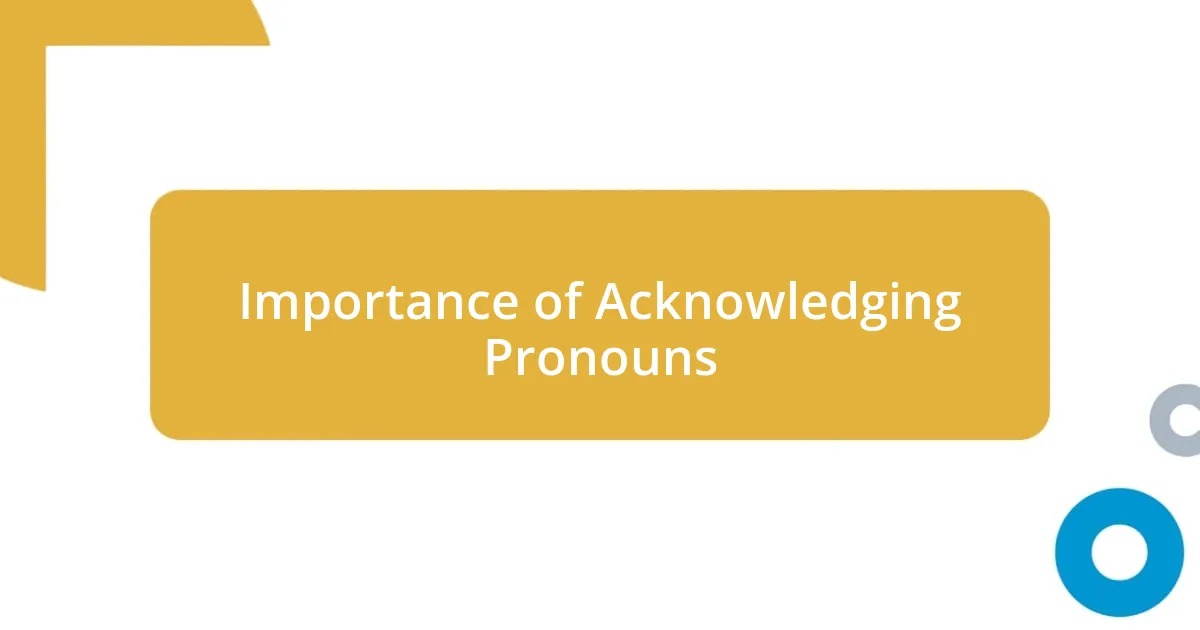
Importance of Acknowledging Pronouns
Acknowledging pronouns is not just about politeness; it’s fundamentally about validating a person’s identity. I vividly remember a moment at a conference where someone introduced me with the correct pronouns right after a coworker misidentified me. The subtle shift in the room was palpable. It felt like a warm light breaking through a gloomy cloud, reminding all of us that our words hold power and that recognition can create an environment of respect and acceptance.
Understanding the importance of pronouns can lead to more positive interactions and relationships. Here are some aspects to consider:
- Self-Validation: Correctly using someone’s pronouns reinforces their identity and fosters a sense of belonging.
- Modeling Respect: Acknowledging pronouns sets a standard for others, encouraging a culture of respect.
- Reducing Misunderstandings: Clear communication can prevent unnecessary confusion and potential conflict.
- Creating Safe Spaces: When pronouns are acknowledged, it contributes to safer environments where everyone can feel accepted and appreciated.
- Supporting Mental Health: Use of correct pronouns has been linked to improved mental well-being, enhancing overall quality of life for individuals.
In these small but significant ways, we can all contribute to making the world a more inclusive place, honoring diverse identities with just a few words.
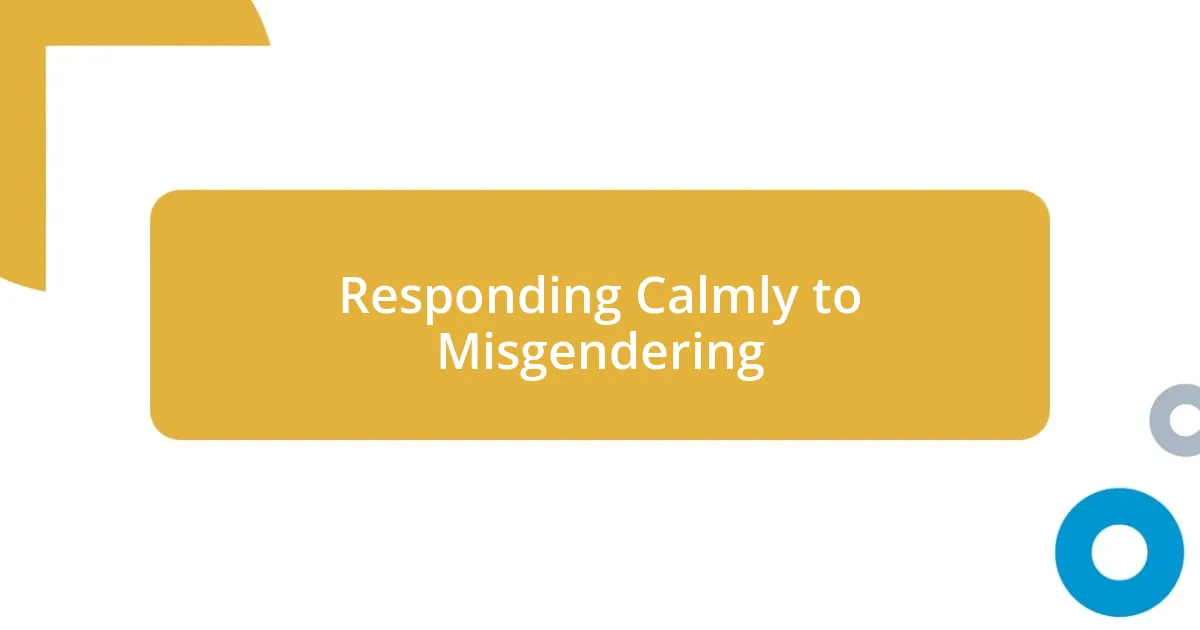
Responding Calmly to Misgendering
When faced with misgendering, staying calm can significantly alter the outcome. I remember a day at work when a colleague mistakenly used she/her pronouns. Instead of reacting defensively, I took a deep breath, paused, and gently corrected them. Not only did this approach diffuse the tension, but it also opened a window for a moment of understanding, allowing us to engage in a meaningful conversation about respect for identity.
Sometimes, my emotions can run high, especially when misgendering comes from someone I care about. In those instances, I remind myself of the importance of patience. On a recent outing, my best friend slipped up in front of a group. Instead of feeling hurt, I chose to respond with a sense of humor. “Close, but not quite! It’s they/them for me.” This light-hearted reply not only eased any awkwardness but also helped reinforce my identity without causing discomfort.
In moments of misgendering, consider using a technique I often rely on: “the three R’s” – reflect, rephrase, and reaffirm. When someone misgenders me, I reflect on how I feel, rephrase my pronouns calmly, and reaffirm our connection. This practice keeps the conversation constructive. I find that, by engaging thoughtfully, I pave the way for a deeper understanding and a stronger bond with those around me.
| Response Strategy | Effect |
|---|---|
| Calm Correction | Encourages understanding and respect |
| Humor | Eases tension and fosters connection |
| Reflect, Rephrase, Reaffirm | Promotes constructive dialogue |
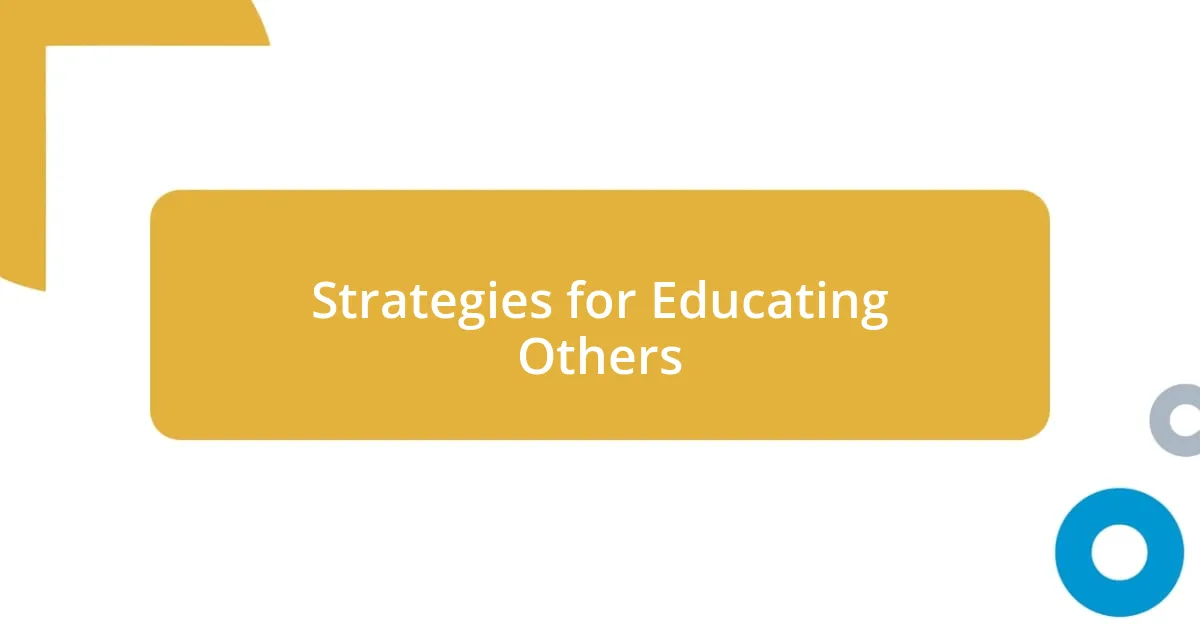
Strategies for Educating Others
Educating others about the significance of using correct pronouns can sometimes feel daunting, but I’ve found that storytelling often works wonders. I once shared my journey with a group of friends, detailing moments when incorrect pronouns made me feel invisible. The room fell silent, and I could see their expressions shift as they realized how deeply these situations affected me. Isn’t it fascinating how personal stories can humanize a topic and lead to a shift in perspective?
I also believe in the power of resources. There have been instances where I’ve handed out articles on gender identity and inclusivity to curious colleagues. One flyer contained a simple infographic about pronouns, and to my surprise, it sparked a lively discussion. People started sharing their thoughts and experiences. It was encouraging to see how knowledge can inspire change—do you think seeing visual representations of these concepts helps make them more relatable?
Another approach I’ve embraced is creating a welcoming environment for questions. I often create opportunities for one-on-one conversations where people can ask me anything about my pronouns without fear of feeling awkward. Just last week, a coworker approached me when we were grabbing coffee, grateful for the chance to ask about my identity. It struck me how important it is to foster open dialogues, making it clear that curiosity is welcomed, not shunned. Wouldn’t we all benefit from more open conversations about identities?
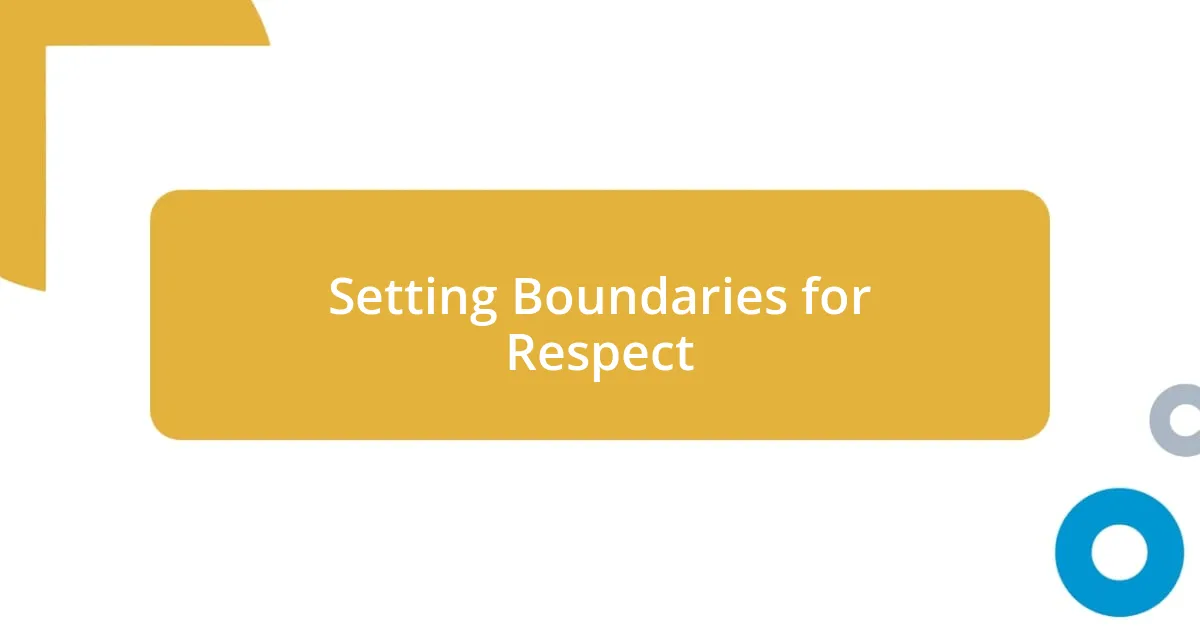
Setting Boundaries for Respect
Setting personal boundaries is essential for fostering respect around our identities. One time, during a dinner with family, my cousin misgendered me in front of everyone. Rather than brushing it off, I calmly said, “I need you to know that using my correct pronouns is really important to me.” It was a moment of vulnerability, yet it opened the door for my family to understand just how significant respect in this area is, not only for me but for everyone.
In my experience, being direct doesn’t mean I have to be harsh. For instance, at a work event, a colleague kept using the wrong pronouns despite my previous corrections. I decided to address it privately. I approached them later and said, “I value our working relationship, but I need to set a boundary. Using my correct pronouns makes me feel respected and accepted.” This simple yet assertive conversation helped clarify my expectations while allowing a constructive dialogue to emerge.
I often think about how boundaries can be misunderstood. My friend once told me they felt uncomfortable setting boundaries themselves. I encouraged them by sharing my own journey. “Setting a boundary isn’t just about drawing a line; it’s about teaching others how to honor who we are.” The look of relief on their face reminded me of the power these conversations hold. When we advocate for ourselves, we aren’t just creating a safer space for us; we’re also paving the way for others to feel empowered to do the same.
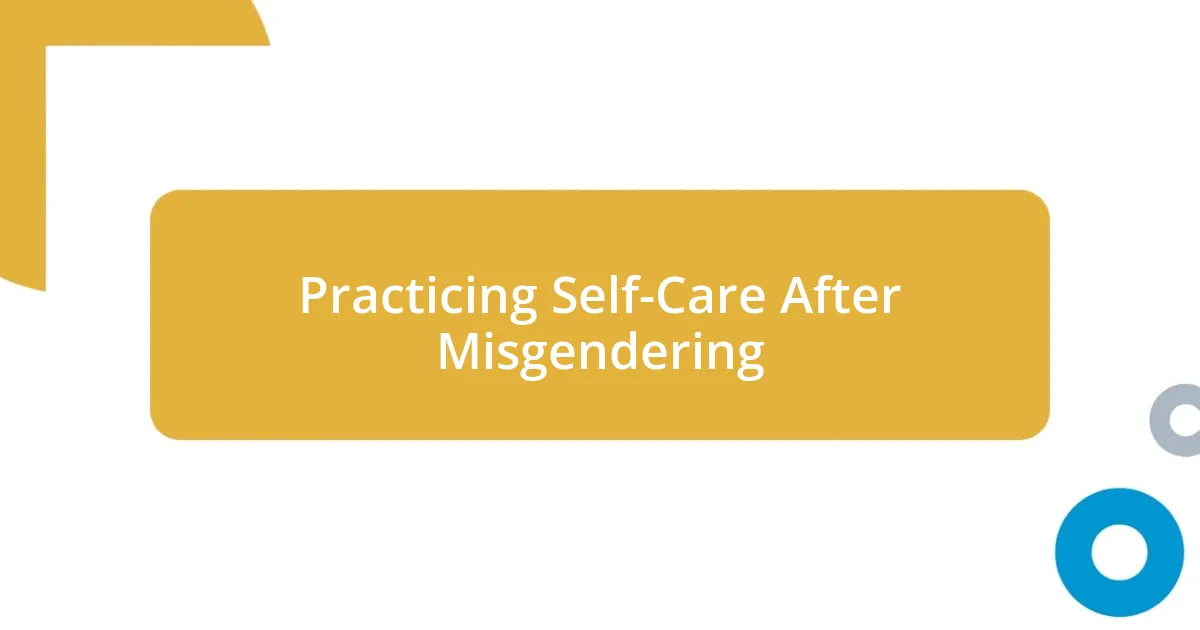
Practicing Self-Care After Misgendering
After experiencing misgendering, I’ve often found that taking time for myself is crucial. For instance, I remember a day when the wrong pronouns were used in a team meeting, and the impact left me feeling heavy. I went home and curled up with my favorite book, allowing myself to drift into another world. Isn’t it amazing how a simple escape can help reset our minds?
Sometimes, expressing my feelings through art or journaling can be incredibly therapeutic. I vividly recall a night filled with frustration after being misgendered repeatedly in social settings. I grabbed my sketchbook and poured my emotions onto the page. This release not only brought clarity but also transformed my feelings into something tangible. Have you ever noticed how creativity can be an avenue for healing?
Finding supportive circles has also been a game-changer for my self-care routine. After a particularly rough week, where my identity felt constantly overlooked, I reached out to a few friends who truly understand. We gathered for a movie night filled with laughter and shared stories, reaffirming our connection. This reminder of community validated my experiences and reminded me that I’m not alone. Do you find that surrounding yourself with supportive people can make a significant difference in your emotional well-being?
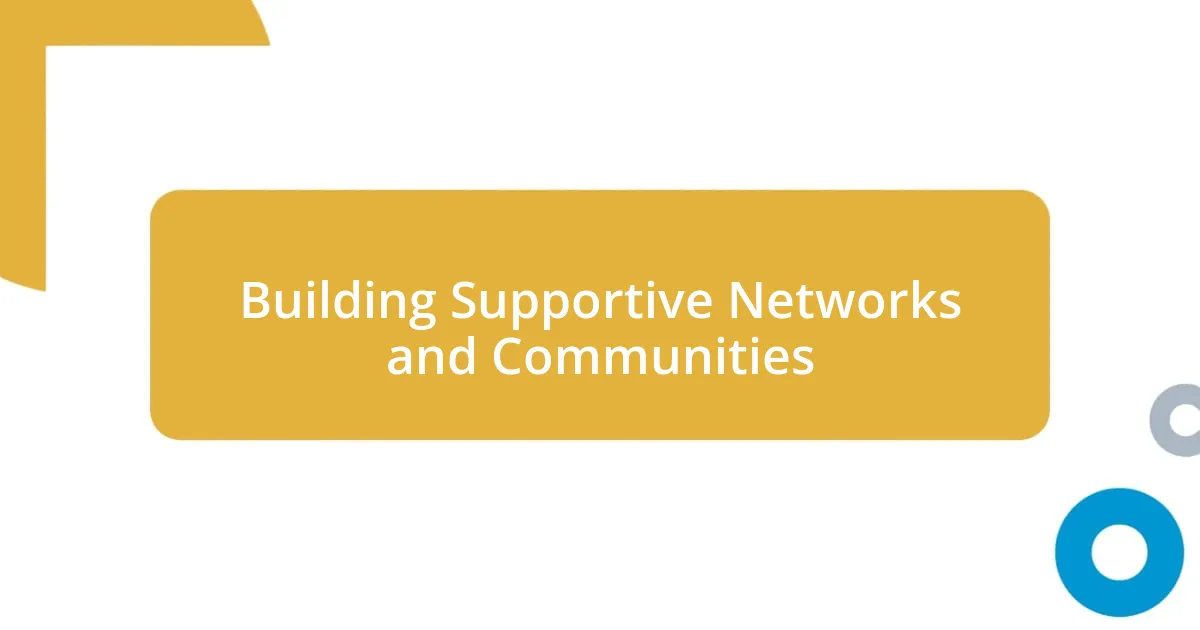
Building Supportive Networks and Communities
Building strong, supportive networks is something I deeply value. I remember attending a local LGBTQ+ group meeting for the first time. As I sat in that cozy circle, listening to stories of resilience and support, I felt an overwhelming sense of belonging. It struck me how essential these communities are for sharing experiences and knowing that others fully understand the challenges we face. Have you ever found solace in a group of like-minded individuals?
Connecting with allies can also amplify our voice. I once collaborated with a few friends on a community initiative aimed at raising awareness about gender identity issues. Not only did we create educational materials, but we also hosted workshops where people could learn about pronouns and respectful communication. Seeing participants leave with a new understanding was incredibly fulfilling. Doesn’t it feel great when shared passions come together to create real change?
Moreover, nurturing these relationships over time can be life-changing. I’ve forged lifelong friendships with people I met in support groups. When one of my friends faced a misgendering incident in public, we rallied around them for support, reinforcing that they were never alone in these challenges. Surrounding ourselves with compassion and understanding doesn’t just buffer the sting of misgendering; it strengthens the very foundation of our identities. How have your own friendships contributed to your sense of empowerment?






